

Holidays are the ideal time for enjoying family, celebrating, and counting your blessings. Then there’s the reality of disrupted schedules, endless errands, and holiday stress! Fortunately, nature offers several calming, anxiolytic botanicals to help you and your patients navigate this holiday season with grace, patience, and joy.
The botanicals described below are evidence-based treatment options for anxiety and stress management to consider for continuous or seasonal use.
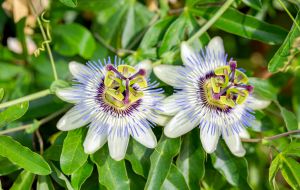
Passionflower (Passiflora incarnata) – A Powerful Anxiolytic & Sedative
Passionflower has a long history of traditional use for anxiety and sleep support. As of 2022, 14 animal model studies have assessed the anxiolytic effect of various passionflower extracts. All studies reported anxiolytic effects, and sedative effects were seen with the highest doses.1
Several clinical trials have also explored the anxiolytic benefits of passionflower. Results demonstrate significant reductions in anxiety symptoms in the participants. One double-blind, randomized, controlled trial (RCT) compared the effects of passionflower extract to oxazepam, a benzodiazepine medication. The results showed that the anxiolytic effects of passionflower were equivalent to those of oxazepam after four weeks. Two RCTs that used different passionflower extracts demonstrated both preparations significantly reduced acute anxiety compared with placebo in preoperative participants.1
One study that included 40 dental surgery patients showed passionflower administered 30 minutes before surgery reduced subjective anxiety along with physiological indicators, including blood pressure and heart rate, to the same extent as the benzodiazepine midazolam with fewer side effects.2
Passionflower is a dose-dependent, powerful plant sedative, so be cautious with the dosing and avoid performing tasks that involve operating heavy machinery, such as driving, while taking passionflower.3
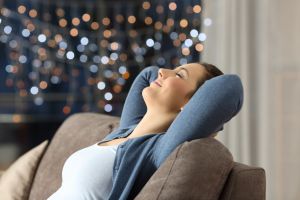
Lulling Lavender (Lavandula angustifolia) for a Relaxing Holiday Season
Research on lavender flower essential oil capsules suggests anxiolytic effects in patients with Generalized Anxiety Disorder (GAD) and subthreshold anxiety disorders. The results show lavender essential oil is at least as effective as the selective serotonin-reuptake inhibitor (SSRI) medication paroxetine. When compared directly to the medication lorazepam (a benzodiazepine), the anxiolytic effects of the lavender essential oil are similar. According to the data, no dependency or withdrawal symptoms are associated with lavender essential oil, so it can be safely discontinued without tapering even after long-term use, which suggests it could be superior to pharmaceutical options.4
A patient-level, symptom-based, post-hoc analysis of all double-blind, placebo-controlled trials investigating the anxiolytic effects of lavender flower essential oil capsules was recently published in 2024. According to the analysis, there is a clear association between the initial severity of anxiety symptoms and the magnitude of the treatment effect of the lavender essential oil in comparison to placebo. Remarkably, even those with mild or moderate anxiety experienced significant improvements in several symptoms, including anxious mood, insomnia, intellectual impairment, and muscular complaints with the lavender essential oil capsules.5
Research also suggests aromatherapy inhalation with lavender essential oil could be a beneficial therapeutic intervention for stress and anxiety.6 Please note most commercially available essential oils are not safe for internal use.

Lemon Balm (Melissa officinalis) – Clinically Effective Herbal Medicine for a Fun & Festive Holiday Season
Lemon balm naturally grows in Mediterranean and West Asian areas and can be enjoyed as a tea or supplement. The European Medicines Agency notes lemon balm is effective as a sleep aid and for relieving the symptoms of mental stress based on traditional use.3
Modern research shows lemon balm extract inhibits GABA transaminase activity to increase levels of GABA, which could contribute to its anxiolytic activity. Evidence also suggests bioactive constituents in lemon balm can bind to cholinergic receptors (muscarinic and nicotinic receptors) and GABAA receptors. Lemon balm extract administered orally to animal models reliably produces increased GABA levels and sedative, narcotic, and anxiolytic effects.3,7
An abundance of clinical studies assessed the benefits of lemon balm extract. One clinical trial included 20 healthy volunteers who received 300, 600, or 900 mg of lemon balm extract daily. The results show that self-reported calmness increased within one to three hours after the 300 mg dose. The 300 mg dose also accelerated mathematical processing in participants, which could be helpful when shopping or trying a new holiday recipe. A similar study showed that 600 mg of lemon balm extract increased calmness and decreased alertness.3
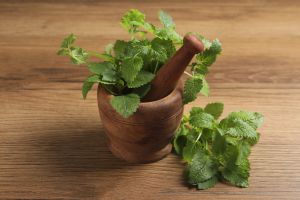
A randomized, placebo-controlled trial that included patients with Alzheimer’s disease showed superior effects of lemon balm aromatherapy on agitation compared to donepezil or placebo.3 Participants diagnosed with anxiety disorder and sleep disturbance in an uncontrolled clinical trial took a standardized lemon balm extract for 15 days. The lemon balm significantly alleviated the anxiety and insomnia.3,8
A randomized placebo-controlled trial with 71 volunteers showed that supplementation with 500 mg of lemon balm extract for 14 days reduced heart palpitations and anxiety.3 A recent meta-analysis published in 2021 concluded that lemon balm extract is effective in reducing the symptoms of anxiety and depression.3,9 Additional recent clinical studies confirm the clinical efficacy of lemon balm supplements.10,11
Lemon balm also appears to be very safe. A 90-day toxicological study reported no lemon balm-related adverse effects on clinical, hematological, biochemical, macroscopic, or histopathologic parameters.12 Since research shows lemon balm can have sedative effects, caution is warranted when driving or operating machines while supplementing with this botanical medicine.3

Enjoy Going Home for the Holidays with Calming Chamomile (Matricaria recutita)
Chamomile flowers have a long history of being steeped and consumed as a calming tea. Chamomile tea is widely consumed throughout Europe and other parts of the world. Researchers are just beginning to investigate the underlying pharmacology behind the anxiolytic action of chamomile. Preclinical research suggests chamomile has a range of effects on the GABA system. Apigenin, one of the active constituents in chamomile, appears to have a low affinity for the benzodiazepine receptor, which induces anxiolytic activity. But, because the affinity is so low, other mechanisms could be involved in chamomile’s anxiolytic effects.1,4
An eight-week double-blind RCT that investigated the efficacy of chamomile extract in reducing anxiety symptoms in individuals diagnosed with generalized anxiety disorder (GAD) determined chamomile provides a statistically significant reduction in anxiety symptoms compared to placebo.1,4

Anxiolytic Ashwagandha (Withania somnifera)
Several animal studies have demonstrated the calming, anxiolytic effects of Ashwagandha. The results of one study show Ashwagandha displays GABA-mimetic activity and attenuates stress-related parameters, including cortisol levels, mental depression, and sexual dysfunction, after administration for 21 days. The active constituents extracted from Ashwagandha root administered once daily for five days in another animal study induced an anxiolytic effect comparable to that produced by lorazepam, a benzodiazepine.1
A recent systematic review and meta-analysis of randomized, controlled clinical trials determined Ashwagandha supplementation significantly reduces anxiety and stress levels compared to placebo.13

De-Stress with Soothing Skullcap (Scutellaria spp.)
Traditionally, Skullcap has been sought across North America and Europe for its relaxing, tonic effects on the nervous system. In vitro research shows the active constituent baicalein is a weak benzodiazepine receptor ligand. Baicalein also demonstrates anxiolytic and sedative effects via its interaction with GABAA non-benzodiazepine receptor sites. Research suggests other bioactive constituents from Skullcap interact with benzodiazepine receptors in the GABA system and serotonin receptors to facilitate a calming response.1
The results of in vivo animal studies suggest baicalein attenuates anxiety-like behaviors, neuropathic pain, and stress-induced hippocampal neuronal apoptosis via its effects on the serotonergic system, spinal delta-opioid receptors, and the SIRT1/PARP1 signaling pathway.14,15
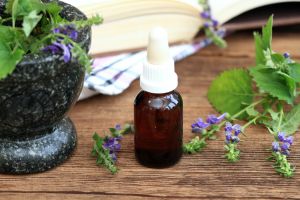
Additional animal studies suggest the constituents in Skullcap are beneficial for depression, which can be associated with anxiety. Researchers note the molecular mechanisms of the antidepressant effects of Skullcap include amelioration of mitochondrial dysfunction, regulation of the HPA axis, reduction of neuronal apoptosis, promotion of neurogenesis, and the inhibition of inflammation and oxidative stress.16
One double-blind, crossover RCT that investigated the acute anxiolytic effects of Skullcap in 19 healthy adults determined Skullcap reduced anxiety.1 Anecdotal evidence, preclinical studies, and traditional use suggest Skullcap reliably offers a calming effect, but more clinical trials are needed to confirm the anxiolytic benefits of Skullcap.

Enjoy an Active Holiday Season with Eleuthero (Acanthopanax senticosus)
Eleuthero is also known as Acanthopanax senticosus, Eleutherococcus senticosus, Siberian ginseng, and Ciwujia.17-19 According to the Chinese Pharmacopoeia, Eleuthero is a traditional Chinese medicine widely prescribed to tranquilize the mind, fortify the spleen, nourish and invigorate qi, and tonify the kidney.17,18
Eleuthero has an impressive range of molecular, animal, and human research studies that demonstrate antioxidant, anti-inflammatory, neuroprotective, antineoplastic, hepatoprotective, and cardioprotective benefits.18,20-32 Evidence suggesting Eleuthero offers anxiolytic and anti-stress effects while boosting endurance is also available.
A recent animal study discovered that those who took Eleuthero extract for three months showed a significant alleviation of anxiety and nervousness.33 Anxiety can deplete energy levels, but, according to another animal study, Eleuthero extract enhances recovery from physical fatigue by increasing energy availability via increased fatty acid β-oxidation in skeletal muscles.34
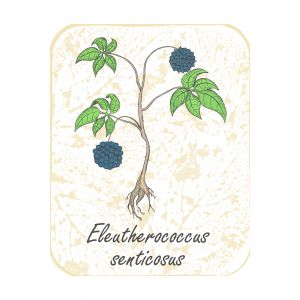
According to Miyazaki et al., Eleuthero is an adaptogen that increases stress resistance, prevents stress-induced gastric ulcers, and alleviates anxiety by regulating autonomic nerve function and increasing hippocampal brain-derived neurotrophic factor (BDNF) signaling.35 Research also suggests Eleuthero could fight diet-related obesity and insulin resistance while maintaining optimal mental health, which is highly beneficial when holiday treats are everywhere!35,36
The active constituents in Eleuthero are known as Eleutherosides, and they offer anti-fatigue, anti-stress, and anti-inflammatory benefits with no adverse effects in healthy individuals, according to the latest clinical research.37,38 Eleuthero liquid extract also safely reduces reactive anxiety in healthy research participants.39
As a holiday bonus, please note Eleuthero could be the ideal ally for extreme holiday shopping! The results of a well-conducted clinical trial suggest eight weeks of supplementation with Eleuthero extract significantly enhances endurance capacity, boosts cardiovascular function, and beneficially alters metabolism.40

Navigate the holiday season effortlessly with less stress and anxiety by adding these supportive botanical powerhouses to your supplement routine and prescribing them to your patients when indicated.
If stress is a concern for you or your patients this holiday season, order an Adrenal Stress Index Panel for insight into the health of the Hypothalamic-Pituitary-Adrenal (HPA) axis.
To place a test order, click here. As a reminder, DiagnosTechs will drop ship test kits directly to your patients. You may select this option at the top of the order form.
Please visit our Provider Tools page for more information about choosing the right test and Adrenal Restoration.
References:
- Sarris J, McIntyre E, Camfield DA. Plant-based medicines for anxiety disorders, part 2: a review of clinical studies with supporting preclinical evidence [published correction appears in CNS Drugs. 2013 Aug;27(8):675. Dosage error in article text]. CNS Drugs. 2013;27(4):301-319. doi:10.1007/s40263-013-0059-9
- Sarris J. Herbal medicines in the treatment of psychiatric disorders: 10-year updated review. Phytother Res. 2018;32(7):1147-1162. doi:10.1002/ptr.6055
- Kenda M, Kočevar Glavač N, Nagy M, Sollner Dolenc M. Medicinal Plants Used for Anxiety, Depression, or Stress Treatment: An Update. Molecules. 2022;27(18):6021. doi:10.3390/molecules27186021
- Antos Z, Zackiewicz K, Tomaszek N, et al. Beyond Pharmacology: A Narrative Review of Alternative Therapies for Anxiety Disorders. Diseases. 2024;12(9):216. doi:10.3390/diseases12090216
- Dold M, Möller HJ, Volz HP, et al. Baseline symptom severity and efficacy of Silexan in patients with anxiety disorders: A symptom-based, patient-level analysis of randomized, placebo-controlled trials. Eur Psychiatry. 2024;67(1):e23. doi:10.1192/j.eurpsy.2024.16
- Hedigan F, Sheridan H, Sasse A. Benefit of inhalation aromatherapy as a complementary treatment for stress and anxiety in a clinical setting – A systematic review. Complement Ther Clin Pract. 2023;52:101750. doi:10.1016/j.ctcp.2023.101750
- Stojanović NM, Mladenović MZ, Randjelović PJ, et al. The potential of lemon balm (Melissa officinalis L.) essential oil as an anti-anxiety agent – is the citronellal the activity carrier?. J Ethnopharmacol. 2023;314:116661. doi:10.1016/j.jep.2023.116661
- Cases J, Ibarra A, Feuillère N, et al. Pilot trial of Melissa officinalis L. leaf extract in the treatment of volunteers suffering from mild-to-moderate anxiety disorders and sleep disturbances. Med J Nutrition Metab. 2011;4(3):211-218. doi:10.1007/s12349-010-0045-4
- Ghazizadeh J, Sadigh-Eteghad S, Marx W, et al. The effects of lemon balm (Melissa officinalis L.) on depression and anxiety in clinical trials: A systematic review and meta-analysis. Phytother Res. 2021;35(12):6690-6705. doi:10.1002/ptr.7252
- Kara M, Sahin S, Rabbani F, et al. An in vitro analysis of an innovative standardized phospholipid carrier-based Melissa officinalis L. extract as a potential neuromodulator for emotional distress and related conditions. Front Mol Biosci. 2024;11:1359177. doi:10.3389/fmolb.2024.1359177
- Bano A, Hepsomali P, Rabbani F, et al. The possible “calming effect” of subchronic supplementation of a standardised phospholipid carrier-based Melissa officinalis L. extract in healthy adults with emotional distress and poor sleep conditions: results from a prospective, randomised, double-blinded, placebo-controlled clinical trial. Front Pharmacol. 2023;14:1250560. doi:10.3389/fphar.2023.1250560
- Lobach AR, Schmidt F, Fedrizzi D, Müller S. Toxicological safety evaluation of an aqueous lemon balm (Melissa officinalis) extract. Food Chem Toxicol. 2024;187:114565. doi:10.1016/j.fct.2024.114565
- Akhgarjand C, Asoudeh F, Bagheri A, et al. Does Ashwagandha supplementation have a beneficial effect on the management of anxiety and stress? A systematic review and meta-analysis of randomized controlled trials. Phytother Res. 2022;36(11):4115-4124. doi:10.1002/ptr.7598
- Ruan L, Guan K, Wang Y, et al. Baicalein exerts anxiolytic and antinociceptive effects in a mouse model of posttraumatic stress disorder: Involvement of the serotonergic system and spinal delta-opioid receptors. Prog Neuropsychopharmacol Biol Psychiatry. 2023;122:110689. doi:10.1016/j.pnpbp.2022.110689
- Ma Z, Feng D, Rui W, Wang Z. Baicalin attenuates chronic unpredictable mild stress-induced hippocampal neuronal apoptosis through regulating SIRT1/PARP1 signaling pathway. Behav Brain Res. 2023;441:114299. doi:10.1016/j.bbr.2023.114299
- Wang C, Gao MQ. Research Progress on the Antidepressant Effects of Baicalin and Its Aglycone Baicalein: A Systematic Review of the Biological Mechanisms. Neurochem Res. 2024;49(1):14-28. doi:10.1007/s11064-023-04026-3
- Lau KM, Yue GG, Chan YY, et al. A review on the immunomodulatory activity of Acanthopanax senticosus and its active components. Chin Med. 2019;14:25. doi:10.1186/s13020-019-0250-0
- Li T, Ferns K, Yan ZQ, et al. Acanthopanax senticosus: Photochemistry and Anticancer Potential. Am J Chin Med. 2016;44(8):1543-1558. doi:10.1142/S0192415X16500865
- Jia A, Zhang Y, Gao H, et al. A review of Acanthopanax senticosus (Rupr and Maxim.) harms: From ethnopharmacological use to modern application. J Ethnopharmacol. 2021;268:113586. doi:10.1016/j.jep.2020.113586
- Fei XJ, Zhu LL, Xia LM, et al. Acanthopanax senticosus attenuates inflammation in lipopolysaccharide-induced acute lung injury by inhibiting the NF-κB pathway. Genet Mol Res. 2014;13(4):10537-10544. doi:10.4238/2014.December.12.16
- Kuang F, Xiang T. Molecular mechanism of Acanthopanax senticosus in the treatment of Alzheimer’s disease based on network pharmacology and molecular docking. Mol Divers. 2023;27(6):2849-2865. doi:10.1007/s11030-022-10586-3
- Wang X, Zhang X, Su J, Chu X. Acanthopanax senticosus total flavonoids alleviate lipopolysaccharide-induced intestinal inflammation and modulate the gut microbiota in mice. Biosci Rep. 2022;42(2):BSR20212670. doi:10.1042/BSR20212670
- Graczyk F, Gębalski J, Sulejczak D, et al. UHPLC-DAD/ESI-TOF-MS Phytochemical Characterization and Evaluation of the Impact of Eleutherococcus senticosus Fruit Intractum on Biochemical, Hepatological, and Blood Parameters in Balb/c Mice. Int J Mol Sci. 2024;25(17):9295. doi:10.3390/ijms25179295
- Zhang X, Zhang Q, Yu M, et al. Integrating serum pharmacochemistry and network pharmacology to explore the molecular mechanisms of Acanthopanax senticosus (Rupr. & Maxim.) Harms on attenuating doxorubicin-induced myocardial injury. J Ethnopharmacol. 2024;319(Pt 3):117349. doi:10.1016/j.jep.2023.117349
- Huang L, Zhao H, Huang B, et al. Acanthopanax senticosus: review of botany, chemistry and pharmacology. Pharmazie. 2011;66(2):83-97.
- Kawano Y, Tanaka M, Satoh Y, et al. Acanthopanax senticosus ameliorates steatohepatitis through HNF4 alpha pathway activation in mice. Sci Rep. 2024;14(1):110. doi:10.1038/s41598-023-50625-z
- Takahashi Y, Tanaka M, Murai R, et al. Prophylactic and therapeutic effects of Acanthopanax senticosus Harms extract on murine collagen-induced arthritis. Phytother Res. 2014;28(10):1513-1519. doi:10.1002/ptr.5157
- Tohda C, Matsui M, Inada Y, et al. Combined Treatment with Two Water Extracts of Eleutherococcus senticosus Leaf and Rhizome of Drynaria fortunei Enhances Cognitive Function: A Placebo-Controlled, Randomized, Double-Blind Study in Healthy Adults. Nutrients. 2020;12(2):303. doi:10.3390/nu12020303
- Kim C, Bae HM, Baik I. Potential Antiaging and Hepatoprotective Effects of Acanthopanax senticosus Extracts in Adult Rat Models. Rejuvenation Res. 2023;26(2):51-56. doi:10.1089/rej.2022.0051
- Lee YJ, Chung HY, Kwak HK, Yoon S. The effects of A. senticosus supplementation on serum lipid profiles, biomarkers of oxidative stress, and lymphocyte DNA damage in postmenopausal women. Biochem Biophys Res Commun. 2008;375(1):44-48. doi:10.1016/j.bbrc.2008.07.097
- Chen TS, Liou SY, Chang YL. Antioxidant evaluation of three adaptogen extracts. Am J Chin Med. 2008;36(6):1209-1217. doi:10.1142/S0192415X08006533
- Monograph. Eleutherococcus senticosus. Altern Med Rev. 2006;11(2):151-155.
- Zhang Z, Wu Y, Shi D, et al. Acanthopanax senticosus improves cognitive impairment in Alzheimer’s disease by promoting the phosphorylation of the MAPK signaling pathway. Front Immunol. 2024;15:1383464. doi:10.3389/fimmu.2024.1383464
- Sumiyoshi M, Kimura Y. Effects of Eleutherococcus senticosus Cortex on Recovery from the Forced Swimming Test and Fatty Acid β-Oxidation in the Liver and Skeletal Muscle of mice. Nat Prod J. 2016;6(1):49-55. doi:10.2174/2210315506999151207145020
- Miyazaki S, Oikawa H, Takekoshi H, et al. Anxiolytic Effects of Acanthopanax senticosus HARMS Occur via Regulation of Autonomic Function and Activate Hippocampal BDNF⁻TrkB Signaling. Molecules. 2018;24(1):132. doi:10.3390/molecules24010132
- Ahn J, Um MY, Lee H, et al. Eleutheroside E, An Active Component of Eleutherococcus senticosus, Ameliorates Insulin Resistance in Type 2 Diabetic db/db Mice. Evid Based Complement Alternat Med. 2013;2013:934183. doi:10.1155/2013/934183
- Todorova V, Ivanov K, Ivanova S. Comparison between the Biological Active Compounds in Plants with Adaptogenic Properties (Rhaponticum carthamoides, Lepidium meyenii, Eleutherococcus senticosus and Panax ginseng). Plants (Basel). 2021;11(1):64. doi:10.3390/plants11010064
- Deyama T, Nishibe S, Nakazawa Y. Constituents and pharmacological effects of Eucommia and Siberian ginseng. Acta Pharmacol Sin. 2001;22(12):1057-1070.
- Arushanian EB, Mastiagina OA. [Different effect of eleuterococcus on various psychophysiological parameters of healthy humans depending on their chronotype and the day time.] Eksp Klin Farmakol. 2009;72(3):10-12.
- Kuo J, Chen KW, Cheng IS, et al. The effect of eight weeks of supplementation with Eleutherococcus senticosus on endurance capacity and metabolism in human. Chin J Physiol. 2010;53(2):105-111. doi:10.4077/cjp.2010.amk018

